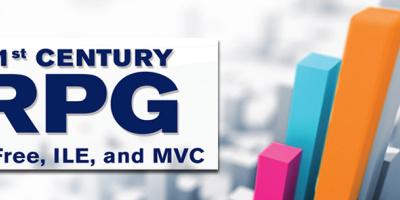With the recent release of Technology Refresh 2 for 7.3, it seems only fair to take a moment and wonder just where RPG is going. Care to join me?
In January, Steve Will posted a blog on IBM Systems magazine about what’s coming up in the future for the IBM i. And certainly Steve would be the one to know. The post was insightful and packed with information. But it did trigger some thoughts in my mind, perhaps more about what wasn’t said than about what was.
The Five-Year Plan
Will’s blog post centered around a little chart that showed the main things that IBM is looking for with the i over the next five years.
- Solutions for Today and the Future
- Systems on Site or in the Cloud
- Simple and Integrated, Secure and Available
I’m not going to completely rehash what he said, but I will mention a couple of quick things in case you didn’t read it.
“Solutions†seemed to revolve mostly around where the i lives: business support. I don’t think anyone sees a big change there, although I believe the way the i is being used in a business is changing big time, but we will get to that. A second part of this point was the almost obligatory nod to mobile, which is, despite my skepticism about the “we’re all going mobile†theme, becoming increasingly important in certain silos.
“Systems on Site or in the Cloudâ€: Uh, and the alternative would be what? I thought that, based on what was written in 2013, by now we were all supposed to have abandoned our hardware and be running on the cloud, but many people cling to the desire to have hardware on the site so that they can control it (and I mean no sarcasm there because I agree with that), and it is good to see IBM affirm that. At the same time, there is junk that can be offloaded to the cloud, and it makes great sense. The fact that the i can be strategically and economically responsible in this arena is great.
Finally, my favorite: “Simple and Integrated, Secure and Available.†I love oxymorons—you know, mutually exclusive terms like “military intelligence†or “free love.†In a world that seems to be increasingly difficult to maneuver, I look forward to the day when everything will be simple and integrated, secure and available. In that future, I imagine myself to be living in a lavish villa northeast of Florence with a dark-eyed girl named Ghisobella who used to be an actress but is now just interested in spending time with me. Looking forward to it.
Certainly, IBM’s goals are lofty, and I can heartily endorse them. But I am left wondering, what does that really mean to me? Using my imagination and sort of reading between the lines, it seems that several themes are interwoven throughout this list.
Hardware
Yeah, I know all about the lycans and the vampires. I watch Kate Beckinsale every chance I get. But that’s nothing compared to the throwdown coming up between IBM and Intel over the next set of chips that will rule the world.
The IBM chips will power the i, and a lot of IBM thought-power has been expended in this arena. We know the POWER8 chips are here. And the POWER9 chips are coming. And pretty soon, the average SMB will need a machine with only one chip in it to do what all of the computers at NASA are currently doing today.
And I like that. I want IBM to win the chip war. And that’s mostly for me. I want to be able to have more reasons to look down on those people who use Intel—that is, the Windows people. (I’m Mac, and it always strikes me as strange that, when filling out a job application, they ask me if I am male or female, which I didn’t think they are allowed to do, but nobody wants to know if I am Mac or Windows, and that seems a lot more important.)
The bottom line is that a great deal of IBM’s attention, across the board, is going to be devoted to hardware and to establishing the POWER chips as the chips of the future. And I like that, but I have to ask myself, how does this help me in my day-to-day work?
Server vs. Thinker
This is probably a poor way to put it, but in the past, it seemed as if the i was the place where the thinking occurred. You had your ERP system, and you ran it on the i, and all of the thinking happened there. But the emphasis today seems to be more on the i as a server than as a thinker—specifically, as a hardware alternative to the standard Windows servers.
And, again, from IBM’s perspective, that’s not a bad thing. As you well know, the i is perfectly suited to being a server, a safe area for your data with fast access.
But again, from the point of view of my day-to-day work, I am left asking, so what? What does that mean for me? In general, it means that other people, on other platforms, will be interrogating the i to get info, and I fail to see how that helps me. After all, I don’t get any snaps for helping the Java people.
Tools
Of course, maybe I should define what is my day-to-day work is. If we want to get specific, there are two tools that are paramount to that: DB2 and RPG. Certainly, with each new release of i5/OS, we see more facilities for DB2 and more ways to tie it into the daily work that we do with the i.
In fact, DB2 is becoming so commonplace in i shops that a number of experts are already suggesting that i shops should do the one thing that we were most proud of never having done—namely, hire DBAs. Why? Because as we move more of the logic from RPG to DB2 views and constraints, the data environment is going to become more complex.
To be honest, I have split feelings about SQL and DB2. I grew up, as a child, in a mainframe environment. We had DBAs if you did anything to the database, tech support people if you needed anything moved to production, and other assorted characters.
And then I went to the 400 (actually the 38), and suddenly I could do everything myself—right away! I don’t really want to give that up unless there’s a very good reason.
On the other hand, DB2 (SQL) is the English of the computer world. Much as I like the simplicity of RPG I/O, I know that SQL is the ultimate winner. Everyone knows it (except maybe us), kids in grade school can code it, and it’s exceptionally versatile and powerful (although overly complex sometimes), so it’s the natural language of the future. Because the future is “simple yet integrated,†right? And yes, there might be a little sarcasm there.
And IBM is all over DB2 and integrating it more closely to the i. That is demonstrated in every TR and major release.
But What About RPG?
But the focus of this particular column is RPG, not just the i. So I have to ask myself, what are IBM’s intentions toward RPG? ILE happened 20 years ago. Free-format started happening 15 years ago. BIFs about the same time. And what have we seen lately? Yes, with the latest TR on 7.3, we have a new BIF, and 7.2 gave greater freedom to free-format. But seriously, is that earthshaking?
I don’t want to appear ungrateful, but when you strip away my veneer of civility and refinement, I am just a simple RPG programmer. And I am looking at each release of i5/OS not in terms of what it can do for IBM (although that is important) but in terms of how it makes my job as a programmer easier.
And it seems to me that RPG is not really going anywhere now. A couple of things have been released lately, a new BIF or two, nested data structures (which are important), but nothing really big. Nor do I hear rumors of anything big on the horizon.
Now it is quite possible there are things coming down the pike that I am unaware of. Or maybe RPG has reached its apex. Every product does, and sometimes the worst thing is for companies to try to prolong or extend a product beyond what it can reasonably do.
But I wonder. So much is being planned for the i over the next five years, yet none of it seems to relate to RPG, and I wonder what that means. Although I guess I already know.
What do we, the ones who use it, want from RPG growth? How do we expect the language to grow? What are we hoping to get?
I’m open to input about this.























 More than ever, there is a demand for IT to deliver innovation. Your IBM i has been an essential part of your business operations for years. However, your organization may struggle to maintain the current system and implement new projects. The thousands of customers we've worked with and surveyed state that expectations regarding the digital footprint and vision of the company are not aligned with the current IT environment.
More than ever, there is a demand for IT to deliver innovation. Your IBM i has been an essential part of your business operations for years. However, your organization may struggle to maintain the current system and implement new projects. The thousands of customers we've worked with and surveyed state that expectations regarding the digital footprint and vision of the company are not aligned with the current IT environment. TRY the one package that solves all your document design and printing challenges on all your platforms. Produce bar code labels, electronic forms, ad hoc reports, and RFID tags – without programming! MarkMagic is the only document design and print solution that combines report writing, WYSIWYG label and forms design, and conditional printing in one integrated product. Make sure your data survives when catastrophe hits. Request your trial now! Request Now.
TRY the one package that solves all your document design and printing challenges on all your platforms. Produce bar code labels, electronic forms, ad hoc reports, and RFID tags – without programming! MarkMagic is the only document design and print solution that combines report writing, WYSIWYG label and forms design, and conditional printing in one integrated product. Make sure your data survives when catastrophe hits. Request your trial now! Request Now. Forms of ransomware has been around for over 30 years, and with more and more organizations suffering attacks each year, it continues to endure. What has made ransomware such a durable threat and what is the best way to combat it? In order to prevent ransomware, organizations must first understand how it works.
Forms of ransomware has been around for over 30 years, and with more and more organizations suffering attacks each year, it continues to endure. What has made ransomware such a durable threat and what is the best way to combat it? In order to prevent ransomware, organizations must first understand how it works. Disaster protection is vital to every business. Yet, it often consists of patched together procedures that are prone to error. From automatic backups to data encryption to media management, Robot automates the routine (yet often complex) tasks of iSeries backup and recovery, saving you time and money and making the process safer and more reliable. Automate your backups with the Robot Backup and Recovery Solution. Key features include:
Disaster protection is vital to every business. Yet, it often consists of patched together procedures that are prone to error. From automatic backups to data encryption to media management, Robot automates the routine (yet often complex) tasks of iSeries backup and recovery, saving you time and money and making the process safer and more reliable. Automate your backups with the Robot Backup and Recovery Solution. Key features include: Business users want new applications now. Market and regulatory pressures require faster application updates and delivery into production. Your IBM i developers may be approaching retirement, and you see no sure way to fill their positions with experienced developers. In addition, you may be caught between maintaining your existing applications and the uncertainty of moving to something new.
Business users want new applications now. Market and regulatory pressures require faster application updates and delivery into production. Your IBM i developers may be approaching retirement, and you see no sure way to fill their positions with experienced developers. In addition, you may be caught between maintaining your existing applications and the uncertainty of moving to something new. IT managers hoping to find new IBM i talent are discovering that the pool of experienced RPG programmers and operators or administrators with intimate knowledge of the operating system and the applications that run on it is small. This begs the question: How will you manage the platform that supports such a big part of your business? This guide offers strategies and software suggestions to help you plan IT staffing and resources and smooth the transition after your AS/400 talent retires. Read on to learn:
IT managers hoping to find new IBM i talent are discovering that the pool of experienced RPG programmers and operators or administrators with intimate knowledge of the operating system and the applications that run on it is small. This begs the question: How will you manage the platform that supports such a big part of your business? This guide offers strategies and software suggestions to help you plan IT staffing and resources and smooth the transition after your AS/400 talent retires. Read on to learn:
LATEST COMMENTS
MC Press Online